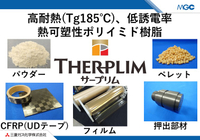[New Material] A new polyester resin that can be used in high-temperature environments of 95°C.
Recruiting applications for new materials & giving away samples to those interested!
We have newly developed a polyester resin called 'ALTESTER' that does not deform even at high temperatures of 95°C, with a transmittance of over 90%. It is heat-resistant and has excellent transparency, with heat resistance improved by over 30°C compared to conventional polyester, which deformed at around 65°C. - Maximum heat resistance of 95°C, usable in vehicle interiors and hot water - Excellent transparency, allowing for free molding through extrusion, injection, blow molding, and foaming - Low refractive index with total light transmittance of over 90%. High transmittance of visible light - Strong chemical resistance to acids, alkalis, alcohols, etc. - Easily blendable with polyester resins such as PET, PET-G, PBT, and PC.
basic information
**Features** This is a new polyester that combines heat resistance and amorphous properties. - Heat resistance: Maximum heat resistance of 95°C PET + 30°C, suitable for use in vehicles and hot water. - Amorphous: Excellent transparency, allowing for free molding through extrusion, injection, blow molding, and foaming. - Safety and hygiene: Free from harmful substances and environmentally hazardous materials. **Performance** - Transparency: High visible light transmittance, with total light transmittance of over 90%. - Chemical resistance: Strong resistance to acids, alkalis, alcohols, and more. - Weather resistance: Usable outdoors by adding UVA.
Price information
Please feel free to contact us.
Delivery Time
Applications/Examples of results
<Shaping> Various shaping methods such as extrusion, injection, blow molding, and foaming are possible. (Shaping temperature: 200–250℃) <Thermoforming> Pressure air vacuum forming, stretching, and heat sealing can be performed. It excels in deep drawing and moldability. <Mechanical Processing> Processing such as cutting, punching, and cold bending can be done without whitening. It is a material that does not easily produce fuzz on the cross-section. <Surface Treatment> Vacuum deposition, sputtering, printing, and coating are possible. <Hard Coating> Hardness and scratch resistance can be improved. It is less likely to produce interference fringes and does not compromise design aesthetics. <Blending> It can be blended transparently with polyester and polycarbonate and used as a modifier. PET: ALTESTER20 is easily compatible and can modify crystallinity, etc. PC: ALTESTER30 and 45 are easily compatible and can modify moldability, refractive index, etc.
catalog(1)
Download All CatalogsRecommended products
Distributors
[Green Energy & Chemical Division] With the motto "Expanding in quantity overseas and expanding horizontally domestically," we aim to expand and strengthen our business foundation. For methanol, which is our main product, we will actively pursue overseas expansion while also developing life science product groups, enhancing MMA downstream, and expanding our catalyst business domestically.










